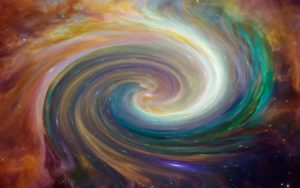Mark and I were at the weekly metaphysical book study group that we love to attend when one of the members commented, “I don’t notice Abraham-Hicks saying much about the Buddhist concept, ‘we are all one.’ ”
Money, and the Law of Attraction
The group had, in weeks past, read Abraham’s latest book, Money, and the Law of Attraction. Even though we’re now reading other books (currently one by Sonia Choquette), the group often relates concepts from the various books we read back to the philosophy of Abraham. And if a question connected to Abraham arises, the group sometimes looks to Mark and me for a response. We’re not experts in Abrahamology, but we are, well, obsessed with the teachings. No, not really obsessed. More like OBSESSED. Ha. We adore the clarity and depth of this philosophy, and we chat about it at home and in the car often.
So…chatting about the question that arose that night, we had to admit that we weren’t sure what Abraham has to say about the idea that humanity is all one, all inter-connected. We certainly didn’t feel that Abraham would disagree with the concept; after all, they’ve said that everyone on earth right now is from the same family of energy. (Could someone please break that news to a few of our warring factions?)
But Abraham doesn’t seem to emphasize the “we-are-all-one” concept that many New Age teachers refer to often.
It occurs to me, now, how much the message of Abraham is about individual creation. We are each the manager of our own thoughts and thus the manager of our own vibration. It is our vibration that attracts, courtesy of the ever-on-duty Law of Attraction, the events and circumstances of our life. Abraham has repeatedly emphasized that nobody, no one, no how can “jump into our experience” and create in our lives – only if we give that person or situation our attention.
Creation is all about mental focus, and that is a decidedly singular process
Even when large groups of people experience events – wonderful or horrible – that are unique to their particular group, it is always a case of each individual being a vibrational match to that circumstance. Groups do not create vibrationally; individuals create vibrationally and often rendezvous with others who are creating vibrationally in similar ways.
Last night, Mark had further insight into this “oneness” concept vis-a-vis Abraham, and he rushed upstairs where I was sitting at this very computer, doing intense work and/or emailing goofy jokes.
“I’ve got it!” Mark declared with excitement. “The oneness that Abraham recommends is oneness with…”
“Omigosh, oneness with our Inner Being!” I broke in, with a sudden sense of revelation and on-going commitment to finishing my guy’s sentences.
“That’s it!” Mark exclaimed. “As we view life increasingly from a good-feeling vantage point, we become more and more like our Inner Being. In fact, when we’re in a state of appreciation, we’re actually blended beings, Abe says. We have merged with our joyful Inner Being. We are one!”
“Yes! And that’s how we allow the well-being that is always knocking at our door to come on in and sit down for a spell! By jove, I think we’ve got it! THIS is the oneness that Abraham talks about!” I proclaimed.
Mark and I high-fived. (Or was it high-tenned…I forget.) Thanks to a timely question by a friend in our book group, we had pondered what we knew of the Abe philosophy and had come up with some answers.
Questions…answers. Problems…solutions. Desires…manifestations. It’s an on-going journey of choosing good-enough feeling thoughts that we arrive at our destinations, having a heck of a good time in the process






